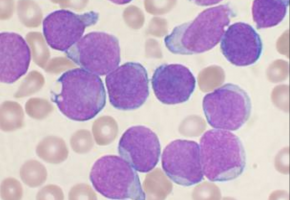
An international team of researchers at VIB-KU Leuven, Belgium, the UK Dementia Institute and the Children's Cancer Institute, Australia, have found a safer treatment for a specific type of leukaemia.
By refining a therapeutic avenue that was previously abandoned because of its severe side effects, they came up with a targeted approach that was both effective and safe in mice and in human cancer cells.
The findings revive hope for translation to patients and have been published in this week's edition of Science Translational Medicine.
T-ALL--short for T-cell acute lymphoblastic leukaemia--is a form of cancer characterised by the presence of too many immature white blood cells.
"T-ALL mainly affects children and is rapidly fatal if left untreated. Current chemotherapy is very effective but causes long-term side effects, so there is an urgent need for less toxic targeted therapies for these young patients," says leukaemia expert Prof. Jan Cools (VIB-KU Leuven).
One of the biological pathways frequently involved in T-ALL is Notch signalling.
Earlier research efforts were geared towards blocking the enzyme gamma-secretase, which cleaves and activates Notch.
Unfortunately, these gamma-secretase inhibitors proved to be too toxic for clinical use because of side effects in a variety of healthy tissues.
Lessons from Alzheimer research
Researchers and clinicians investigating treatments for Alzheimer's disease have been very interested in blocking gamma-secretase as well, because it is also involved in the processing of amyloid-beta, which is linked to neurodegeneration.
Alzheimer specialist Prof. Bart De Strooper (VIB-KU Leuven, UKDRI) who co-led the current study with Jan Cools has had a long interest in the activity of gamma-secretase.
"It is important to realise that gamma-secretase is actually a complex consisting of four protein subunits, two of which exists in very different versions," says Bart De Strooper.
"Clinical trials have been performed with broad-spectrum, non-selective inhibitors that target all different versions of the complex equally. We wanted to explore whether inhibition of specific versions could fine-tune the treatment and reduce side-effects."
The right complex for the job
Dr. Roger Habets and Dr. Charles de Bock, who co-authored the study, found that the relative abundance of two different versions of one of the gamma-secretase complex was strikingly different in leukaemia cells versus healthy cells.
This discovery led them to explore whether inhibiting only this specific version of the complex would prove to be a safer treatment option.
"We saw that targeting only one type of complex was both effective and safe in mouse models and in leukaemia cells from T-ALL patients," explains Roger Habets.
"Not only could we stop the leukaemia from growing, we also found no signs of the toxicity that usually plagues this class of drugs."
A wide range of possibilities
Charles de Bock, who recently moved from Belgium to start his own lab at the Children's Cancer Institute, Australia, is very enthusiastic about rapid translation of this class of drugs into the clinic: "Historically, these types of drugs have had very limited success, since patients did not tolerate the side effects in normal tissues. We provide the first proof of concept that selective targeting of a specific version of the gamma-secretase complex is effective and safe, suggesting this strategy's potential for translation."
But it doesn't have to stop there, add Jan Cools and Bart De Strooper: "If this approach would indeed work for patients with T-ALL, this could open up the door for other types of cancer as well. Safe, selective gamma-secretase inhibition might even be useful as an additional therapy in a variety of other disorders in which Notch signalling is deregulated."
Source: VIB
We are an independent charity and are not backed by a large company or society. We raise every penny ourselves to improve the standards of cancer care through education. You can help us continue our work to address inequalities in cancer care by making a donation.
Any donation, however small, contributes directly towards the costs of creating and sharing free oncology education.
Together we can get better outcomes for patients by tackling global inequalities in access to the results of cancer research.
Thank you for your support.